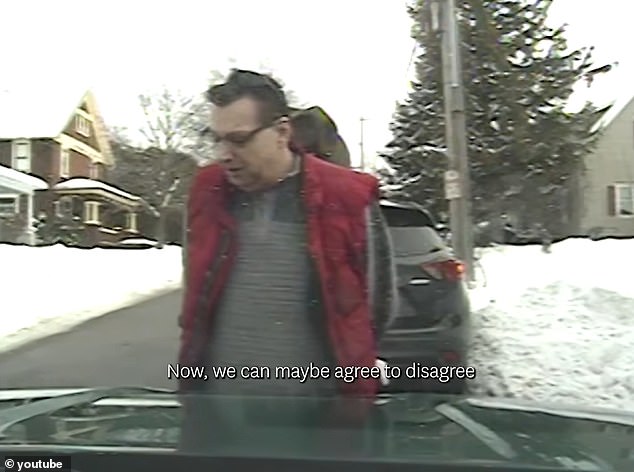Vermont man arrested for flipping off cops at traffic stop gets sweet revenge as state agrees to pay him $175,000
Vermont State Police will pay $175,000 to a man arrested for “flipping the bird” on an officer after he sued the department for violating his First Amendment rights.
Police dashcam footage captured the moment Gregory Bombard was pulled over by Trooper Jay Riggen on a snowy street in St. Albans on February 9, 2018.
Bombard was jailed for more than an hour after cursing at the officer and ultimately sued the department for the unnecessary traffic stop and retaliatory arrest, arguing that it violated his First Amendment rights.
On Wednesday, the department agreed to pay Bombard $100,000 in damages and another $75,000 for his attorney’s fees.
“With this settlement, I hope the Vermont State Police will train its troops to avoid silencing criticism or making unwarranted vehicle stops,” Bombard said.
Gregory Bombard (right) was arrested in 2018 by Vermont State Trooper Jay Riggen (left) because the officer thought the driver had turned him over
“And now at least I can pay my criminal defense attorney to defend me against the false accusations and take my 88-year-old mother out for a nice dinner.”
Riggen said he initially stopped Bombard because he thought the driver had shown him the middle finger.
The trooper let him go after Bombard insisted the officer had made a mistake, but cited him for disorderly conduct when Bombard did it again as he drove away, calling the trooper an “a*****e.”
The prosecutor ultimately dropped the charges, but Bombard filed a civil suit with the support of the Foundation for Individual Rights and Expression (FIRE) and the American Civil Liberties Union (ACLU).
“Swearing at police is not a crime,” says FIRE attorney Jay Diaz. “Calling it ‘disorderly conduct’ is not an excuse to abandon the Constitution, which allows police to silence speech they don’t like.
“Ignorance of the law is no excuse to arrest citizens for nothing more than exercising their rights.”

Bombard sued the department, claiming his First Amendment rights were violated after an unnecessary traffic stop and retaliatory arrest

Riggen initially stopped Bombard because he thought the driver had given him the middle finger, but after letting him go, the officer stopped him and arrested Bombard for swearing at him.
“We will not tolerate police officers who do not understand traffic and parking laws. Well, the Constitution is the supreme law in the land and does not allow police to punish speech they don’t like,” Diaz said.
Video showed Riggen, a 17-year veteran of the department, telling Bombard he stopped him because he feared the finger could be a call for help.
“You need something?” he asked. “It looked like you looked right at me and stuck your middle finger in my face.”
Bombard denied making the gesture, but said: “You must be very sensitive.”
The officer denies being “oversensitive” and claims: “This is the first time in 12 years I’ve stopped someone who gave me the middle finger, so I don’t like that insinuation.”
“Maybe you haven’t, but I think you can agree that if someone is looking for a soldier’s attention, he will probably find it by giving him a negative signal.” Do you agree with that?’
“No, I don’t understand that,” Bombard said.
Riggen eventually accepted Bombard’s denials, but pulled him over again when the driver left.

Police dashcam footage captured the arrest on a snowy street in St Albans on February 9, 2018
“It looks like when he drove away he called me an a*****e and said ‘f*** you’,” Riggen said over the radio. “I flipped the bird. I’m going to arrest him for disorderly conduct.’
Bombard was then ordered to leave and tied to the police cruiser.
“While our client is pleased with this outcome, this incident should never have happened in the first place,” said ACLU of Vermont staff attorney Hillary Rich.
“Police must respect everyone’s First Amendment rights, even when it comes to things they find offensive or offensive.”
“State lawmakers must do more to prevent unnecessary and unwarranted police interactions like Mr. Bombard’s – by reducing the footprint and broad authority of police in our communities,” Rich said.
